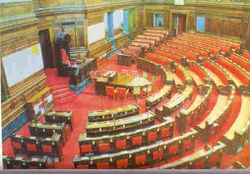Rajya Sabha
| Rajya Sabha | |
|---|---|
 |
|
| Type | |
| Type | Upper house |
| Leadership | |
| The Chairman | Mohammad Hamid Ansari, Independent since 2007 |
| Majority Leader | Prime Minister Manmohan Singh, (INC) since 2007 |
| Opposition Leader | Arun Jaitley, (BJP) since 2009 |
| Structure | |
| Members | 250 (238 elected + 12 appointed) |
| Meeting place | |
 |
|
| Sansad Bhavan | |
| Website | |
| rajyasabha.nic.in | |
The Rajya Sabha (Hindi: राज्य सभा; meaning the "Council of States") is the upper house of the Parliament of India. Membership is limited to 250 members, 12 of whom are chosen by the President of India for their expertise in specific fields of art, literature, science, and social services. These members are known as nominated members. The remainder of the body is elected by state and territorial legislatures. Terms of office are for six years, with one third of the members retiring every two years.
The Rajya Sabha meets in continuous session and, unlike the lower house of parliament, the Lok Sabha, is not subject to dissolution. The Rajya Sabha shares legislative powers with the Lok Sabha, except in the area of supply, where the Lok Sabha has overriding powers. In the case of conflicting legislation, a joint sitting of the two houses is held. However, since the Lok Sabha has more than twice as many members than the Rajya Sabha, it holds de facto veto power in such joint sessions. Only three joint session have been held. The last one was for the passage of the anti-terror law POTA.
The Vice-President of India (currently, Hamid Ansari) is the ex-officio Chairman of the Rajya Sabha. The Deputy Chairman of the Rajya Sabha, who is elected from amongst its members, takes care of the day-to-day matters of the house in the absence of the Chairman.
The Rajya Sabha held its first sitting on 13 May 1952.
Contents |
Membership
Elected Members
There are 238 indirectly-elected members, who represent the 28 states and 2 Union Territories (Delhi and Puducherry), including the National Capital territory, New Delhi. Seats are allotted in proportion to population.
Nominated Members
Under article 80 of the Constitution, out of the 250 members of the Council of States (Rajya Sabha), 12 are nominated by the President of India from amongst persons who have special knowledge or practical experience in the fields such as literature, science, art or social service.
Since its inception in 1952, 105 members have been nominated so far, for a term of 6-year each, and with an added provision that one-third of the members shall retire every two years.[1]
Membership Composition
Members by Party Source: Election Commission of India[2] (as of 14/07/2010)
| Alliances (after 2010 election) | Party | MPs |
|---|---|---|
| United Progressive Alliance Seats: 89 |
Indian National Congress | 70 |
| Nationalist Congress Party | 7 | |
| Dravida Munnetra Kazhagam | 7 | |
| All India Trinamool Congress | 2 | |
| National Conference | 2 | |
| Bodoland People's Front | 1 | |
| National Democratic Alliance Seats: 66 |
Bharatiya Janata Party | 49 |
| Janata Dal (United) | 7 | |
| Shiv Sena | 4 | |
| Shiromani Akali Dal | 3 | |
| Asom Gana Parishad | 2 | |
| Rashtriya Lok Dal | 1 | |
| Third Front Seats: 31 |
Communist Party of India (Marxist) | 15 |
| Communist Party of India | 5 | |
| All India Anna Dravida Munnetra Kazhagam | 5 | |
| Telugu Desam Party | 4 | |
| All India Forward Bloc | 1 | |
| Revolutionary Socialist Party | 1 | |
| Parties supporting UPA from outside Seats: 40 |
Samajwadi Party | 5 |
| Bahujan Samaj Party | 18 | |
| Rashtriya Janata Dal | 4 | |
| Janata Dal (Secular) | 1 | |
| Lok Janshakti Party | 2 | |
| Mizo National Front | 1 | |
| Sikkim Democratic Front | 1 | |
| Nagaland People's Front | 1 | |
| Biju Janata Dal | 6 | |
| Jharkhand Mukti Morcha | 1 | |
| Nominated Seats: 9 |
9 | |
| Other Parties and Independents Seats: 8 |
8 | |
| Vacant Seats Seats: 2 |
2 | |
| Total 245 |
See also
- Members of Rajya Sabha
- Lok Sabha
- Politics of India
- Parliament of India
- Lawmaking procedure in India
References
- ↑ Rajya Sabha Practice and Procedure Series Nominated Members of Rajya Sabha.
- ↑ http://164.100.47.5:8080/members/PartyPosition.asp
Further reading
- The Nominated Members of India's Council of States: A Study of Role-Definition J. H. Proctor, Legislative Studies Quarterly, Vol. 10, No. 1, Feb., 1985), pp. 53-70.
External links
- Report card: Muslim Members of Rajya Sabha during July-Aug ’09 session - TCN News
- Rajya Sabha homepage hosted by the Indian government
- Rajya Sabha FAQ page hosted by the Indian government
- Report 37 Rajya Sabha members have criminal
- Nominated members list
- State wise list
|
||||||||||
|
||||||||||||||||
|
||||||||||
|
||||||||||||||
|
||||||||||||||||||||||||||||||||||||||||||||||||||||||||||
|
||||||||